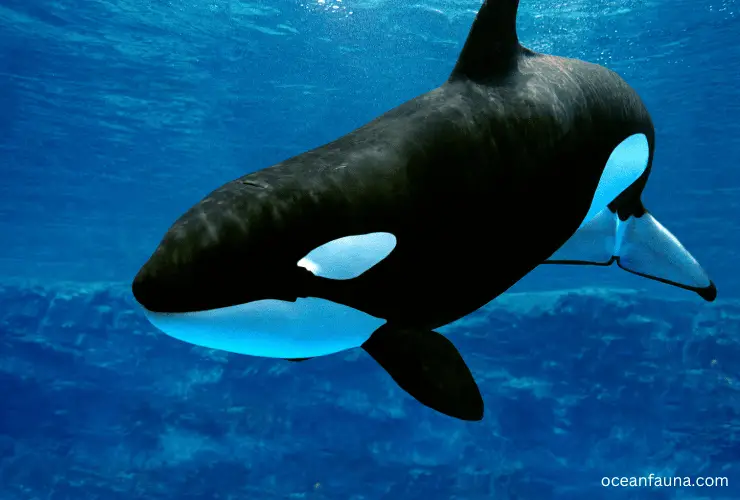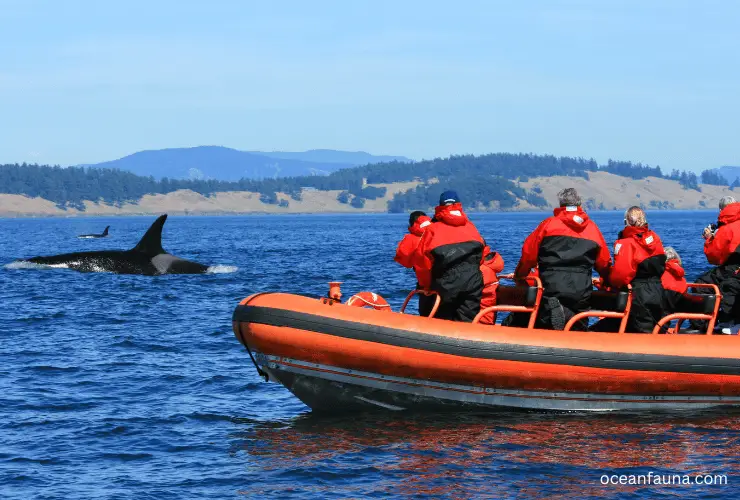Have you ever imagined what it would be like to swim with the apex predator of the ocean, the killer whale? Surprisingly, you can swim with a killer whale.
In this article, I will explain each detail about swimming with the incredible apex predator.
Can You Swim with Killer Whales Or Orcas?
Yes, you can swim with killer whales in some parts of the world. One of the few places that offer this experience is off the coast of Norway, where some tour operators provide boat excursions that allow visitors to get up close and personal with these majestic creatures.
Swimming with orcas is one of the most thrilling and humbling experiences out there. It gives you a chance to observe their behavior in their natural habitat and watch them interact with each other in close proximity. Not only that, but it also allows you to view other whales, like humpbacks.

Visitors should be aware, however, that swimming with killer whales is strictly regulated in order to keep both people and animals safe. Tour operators must obtain local authorities’ permission to participate in this activity, and trained professionals are always present during orca encounters to ensure safety protocols are followed.
Before diving into the water, participants receive detailed briefings about how to behave around orcas so as not to disturb them in any way. It’s vital for everyone involved to understand that swimming with killer whales isn’t an opportunity for entertainment – it’s a privilege that needs to be respected and appreciated at all times.
Are Killer Whales Friendly to Humans?
A killer whale can be both friendly and aggressive to humans. In the wild, orcas have been known to interact with and even protect humans from other predators. Scientists have discovered that orcas can even recognize individual people by their voices alone. This suggests that they may be capable of forming strong connections with people and viewing them as friends or family members.

At the same time, however, orcas have been known to attack trainers in aquatic parks. These attacks don’t appear to be done out of malice. Rather, it seems that the whales may have simply gotten too carried away while playing. While this behavior is certainly dangerous, remember that it doesn’t necessarily mean orcas are hostile toward humans as a whole.
All in all, it’s impossible to make a definitive statement about whether killer whales are friendly toward humans or not. It’s likely true that there are certain circumstances where an orca may feel uncomfortable interacting with people and could become defensive or aggressive when approaching.
On the other hand, many experts agree that there are also instances in which orcas can form strong bonds with individual people and treat them as part of their family or social circle.
Do Killer Whales Bite You?
No, killer whales do not usually bite humans. While a wild orca may bite a human in rare cases, the majority of documented incidents related to orcas biting humans involve those in captivity.
For example, according to the Associated Press, only one human has been bitten by a wild orca, and that happened in California in the early 1970s.
On the other hand, in 2017, a captive orca killed its trainer by dragging her into the pool at SeaWorld Orlando. Other reports indicate that captive orcas have bitten trainers and visitors during shows.
In general, though, orcas don’t usually bite humans. In most cases, they actually seem to be rather gentle and curious when interacting with us. Most wild orcas avoid contact with humans and will only approach boats cautiously and cautiously if they are alone or with their pod members.
This is evidenced by numerous videos and photographs of people swimming with orcas taken in the wild and instances where pods of orcas have been observed protecting people from sharks.
Remember that killer whales are still wild animals that should be treated with respect. While it is unlikely for one to attack you on purpose, they can become agitated and unpredictable if they feel threatened or disturbed while feeding or playing with their pod mates.
Why Are Orcas So Friendly?

Killer whales, also known as orcas, have a reputation as powerful predators, but they are surprisingly non-aggressive toward humans in the wild. There are two main reasons for this friendly behavior:
Selective Diet
Orcas have a selective diet and are not indiscriminate hunters like other predators. Their mothers teach them which prey is safe to eat, and this information is passed down from generation to generation. Humans have never qualified as a food source for orcas, so they have never been attacked by them.
Prey Specificity
Some whale populations only hunt certain types of animals, such as seals or porpoises, and never attack humans. This suggests that once predator-prey dynamics develop between a population and specific prey, there is no need to expand their diet.
When Do Killer Whales Become Aggressive to Human?
Although orca whales in their natural environment are not known to be hostile toward humans, there have been reports of captives exhibiting aggressive behavior against their caretakers and trainers.
To prevent any potential incidents while ensuring the health and welfare of these majestic creatures, you must know why they may act out in aggression. Here are some key reasons for such behavior among captive orcas:
Lack of Space
Orcas are highly intelligent and social animals that require a lot of space and stimulation. In captivity, they may become frustrated by their limited space and the inability to engage in natural behaviors, such as swimming long distances, hunting, and playing. This frustration can lead to aggressive behavior, such as biting or striking out at their handlers or trainers.
Stress
Orcas in captivity can experience stress due to confinement, confinement in small tanks, and lack of contact with their family groups. This stress can cause them to act out aggressively, as they are unable to cope with the unnatural conditions, they are being kept in. Stress can also impact their immune system and increase the risk of disease.
Training Methods

Some training methods used in captive orcas may involve physical punishment or aggression, which can lead to a reinforcement of aggressive behavior. These methods can also cause significant stress and discomfort for the orcas, which can result in further aggressive behavior.
Health Issues
Orcas may become aggressive if they are in pain or experiencing health problems. For example, if they are suffering from an illness or injury, they may become more irritable and prone to aggressive behavior.
Threat and Disturbance
Orcas in captivity may feel threatened by the presence of unfamiliar humans or other disturbances in their environment. For example, loud noises, sudden movements, or unfamiliar objects can all cause stress and anxiety, leading to aggressive behavior as a defense mechanism.
Accidental Interactions
Orcas may also become aggressive if they accidentally come into contact with humans, such as when they are being moved between tanks or during medical procedures. These interactions can cause stress and discomfort, leading to aggressive behavior.
Swimming With Killer Whale: Precaution
Swimming with killer whales is an unforgettable and thrilling experience, yet taking the proper safety measures for both humans and animals is essential. Here are some key precautions to keep in mind when swimming with killer whales:
- Respect Wildlife: Always remember that these are wild animals and should be treated with respect. Do not harass or harm the whales in any way. Keep a safe distance and avoid touching or riding on their backs.
- Follow Guidelines: Follow any guidelines the local authorities or tour operators set. These guidelines are designed to protect both the whales and the humans involved and should be strictly followed.
- Use a Guide: If you are not an experienced swimmer, consider using a guide who is knowledgeable about the whales and their behavior. They can help to ensure your safety and provide information on the best practices for swimming with killer whales.
- Be Prepared: Make sure you are physically and mentally prepared for the experience. Wear appropriate clothing and equipment, such as a wetsuit, fins, and a mask. Make sure you are a strong swimmer and comfortable in the water.
- Respect the Whales’ Space: Keep a safe distance from the whales and respect their personal space. Do not chase or surround them. If a whale approaches you, remain calm and still, and avoid making any sudden movements.
- Watch for Signs of Aggression: Observe the whales for any signs of aggression, such as tail slapping, spy-hopping, or charging. If you see any signs of aggression, leave the area immediately and seek help from your guide or the local authorities.
- Minimize Impact: Be mindful of your impact on the whales and their environment. Do not touch or damage coral reefs, seagrass beds, or other sensitive areas.
Conclusion
Swimming alongside the killer whale can be a life-changing experience that will stay with you forever. Although sightings are unpredictable and encounters are hard to come by, they are incredibly rewarding when they do happen.
To make the most out of your experience, always keep safety in mind and follow guidelines set by local authorities or tour operators. Taking the necessary precautions can help ensure a safe and enjoyable experience for both humans and whales alike.


5 thoughts on “Can You Swim with Killer Whales?”